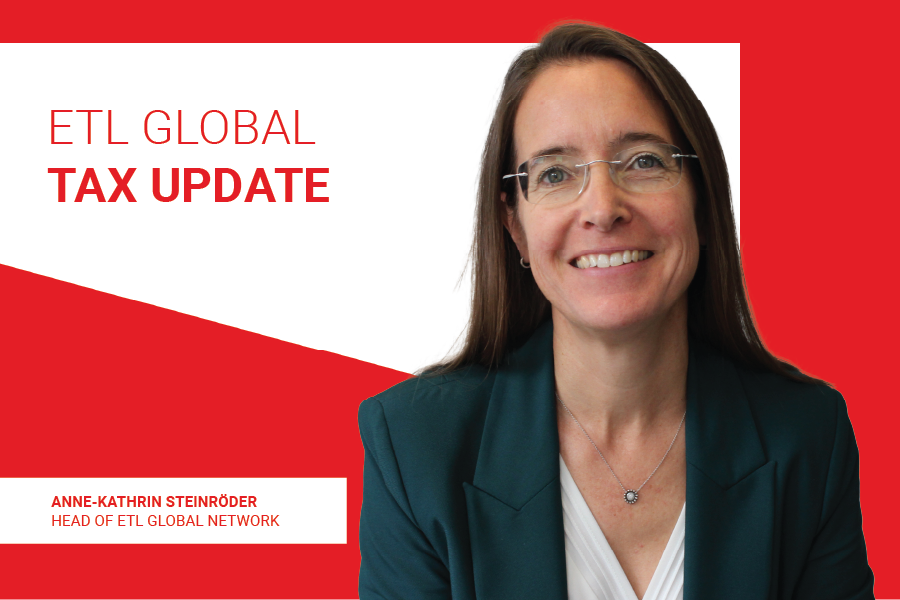ETL GLOBAL Tax Update is a new series designed to provide critical insights into recent developments in international taxation. This initiative is presented by the ETL GLOBAL Tax Working Group, a closely interconnected team of international tax experts within the ETL GLOBAL network. The group’s objective is to share their collective expertise on tax matters, and ensuring that businesses are well-informed about the latest tax regulations and legislative changes around the world.
This first edition of the ETL GLOBAL Tax Update brings you important tax news from the European Union, the United Kingdom, Italy and the Netherlands. These updates are crucial for understanding the ongoing developments in tax laws and their potential impact on international investments and operations.
🇪🇺 EU – Till JOUAUX, In Extenso
International Taxation of Dividends and Interest: A Draft Directive “FASTER” to Optimise Withholding Tax Procedures in the EU.
On May 14, the Council of the European Union (ECOFIN formation) proposed a new version of the “FASTER” draft directive (“Faster and Safer Relief of Excess Withholding Taxes”), which aims to make the conventional procedures for eliminating double taxation safer and faster, while improving the means of combating tax fraud, in order to stimulate investments within the European Union. Bilateral conventional rules will continue to apply but EU law will provide a framework for certain procedural aspects.
The two main measures considered by the Council are the implementation of a common tax residence certificate and the creation of fast-track procedures (relief-at-source and/or quick refund system).
- The common EU digital tax residence certificate will allow investors to benefit from the fast-track procedures implemented by the directive, in the same way regardless of the country of residence within the European Union. Member States will have to issue this digital certificate to certify that taxpayers are indeed tax residents and can therefore benefit from conventional measures of relief or refund of withholding tax, under the new fast-track procedures.
- Fast-track procedures will allow investors to benefit immediately or within a short period of time from conventional measures to eliminate double taxation, either by being subject to the conventional tax rate (when it is more advantageous than the national tax rate) upon payment of dividends or interest (“relief-at-source”), or by obtaining a refund of the difference between the higher national tax rate and the more favourable conventional rate, within a specified period (60 days).
It should be noted that the draft directive is currently limited to withholding taxes on income from shares and bonds listed on stock exchanges. Before transposition by the Member States no later than December 31, 2028, and application from January 1, 2023, the draft directive will be submitted to the European Parliament, and then definitively adopted by the Council.
🇬🇧 UK – Jamie Muirhead, Wildercoe
Pillar 2 rules in the UK.
The rules on the global minimum tax rate have been implemented in the UK for periods commencing on or after 31 December 2023.
The UK rules apply where at least one entity is located in the UK, and consolidated worldwide group annual revenue is in excess of 750 million euros.
Large groups can therefore have a filing obligation in the UK under the new rules, even where the UK presence is very small.
The rules do contain a number of ‘safe harbour’ provision which could mean that a full calculation is not required initially in some circumstances. Careful consideration therefore needs to be given to whether these provisions apply, as opt in requires a formal election. Where this election has not been made before the deadline or has not been made for all previous years, the safe harbour regime cannot be re-entered so it is important to act promptly.
HMRC released guidance and their portal for registration under the regime on 20 May. In scope companies need to register no later than 6 months after the end of the group’s first accounting period that started on or after 31 December 2023.
Changes to non-domicile rules in the UK.
Changes to non-dom rules in the UK formed part of the Spring Budget 2024, under which the “Remittance basis” regime would be replaced by a “Four-Year Foreign Income and Gains” (FIG) regime. Only limited details are currently available on the proposals, which will not be enacted before the upcoming general election on 4 July. Hence there may be substantial changes before coming into force.
The proposals also included a ‘temporary repatriation facility’ to allow individuals who were previously taxed on the remittance basis to bring foreign income and gains into the UK at a reduced tax rate.
There has been an intention to abolish the UK concept of ‘domicile’ in due course, which would also require a substantial re-write of related rules in other areas, including for inheritance tax purposes. We will keep you up to date as matters progress.
🇮🇹 Italy – Marco Nardini, NexumStp
New Criteria for Tax Residence for Individuals and Legal Entities in Italy.
The Legislative Decree no. 209 of 27 December 2023 reforms some aspects of the Italian international tax law framework, such as the criteria to establish tax residence for individuals and legal entities as of 2024.
Tax residence for individuals.
As of 2024 individuals will be considered tax resident of Italy if, for the greater part of the fiscal year, including fractions of a day, they alternatively:
- have their domicile in Italy;
- have their residence in Italy;
- are physically present in Italy.
The decree defines domicile as the place where the individuals’ personal and family relations are primarily located, and residence as the habitual abode. It also considers the fraction of days to determine if an individual is physically present in Italy for the greater part of the fiscal year. The enrolment in the Italian Register of the resident population is considered a rebuttable presumption of residence.
Tax residence for legal entities.
Starting in 2024, an entity will be considered a tax resident of Italy if it meets, alternatively, one of the following criteria:
- has its legal seat in Italy;
- its place of effective management is in Italy;
- its main ordinary management is carried out in Italy.
The decree maintains the criterion of legal seat but modifies the other two criteria. The place of effective management is where the main and most high-level strategic decisions concerning the entity as a whole are taken. The main ordinary management is the day-to-day management of the entity.
🇳🇱 The Netherlands – Jeffrey Schuurmans, ABC Accountants
Amendment to the Box 3 tax system in the Netherlands.
In the year 2001 the Netherlands introduced a completely new personal income tax system. Three types of tax taxable income were introduced.
Box 1: taxable income from work and home.
Box 2: taxable income from a substantial interest in a shareholding.
Box 3: taxable income from savings and investment.
On 24 December 2021, the Dutch Supreme Court ruled that the Box 3 capital gains tax system violates the right to property and the prohibition of discrimination enshrined in the European Convention for the Protection of Human Rights and Fundamental Freedoms (ECHR). In the present case, the Supreme Court has provided legal protection to taxpayers against the violation of fundamental rights by only including in taxation the taxpayer’s actual return.
In the proposal to amend the Box 3 tax system (after the internet consultation), actual returns are taxed in Box 3. Main rule is a ‘vermogensaanwinstbelasting’ (which is a taxation on realised and non-realised capital gains). An exception is made for immovable property and start-ups. For these, a ‘vermogenswinstbelasting’ (a taxation on only realised capital gains) will apply and capital gains or losses on disposal will be taxed.
There will be a step-up for immovable property and business start-ups already owned by taxpayers at the start of the new box 3 tax system. The acquisition price will be set at fair market value. A tax-free income will be introduced (a limited exemption). Furthermore, the debt threshold will no longer apply (under the current legislation, debts are only limited deductible on the value the taxable assets). The flat tax rate is 36%.
It is expected that the proposal will not be able to be fully implemented in 2027 due to its complexity.
This new tax system on real estate is one of the reasons that individuals are thinking of investing outside the Netherlands. But there is more. On a local level the municipalities (of the Dutch major cities) have introduced new rules based upon which the rental income with respect to dwellings is becoming regulated (limited) by the municipality.
The combination of the two results into a very low yield on investments in dwellings.





